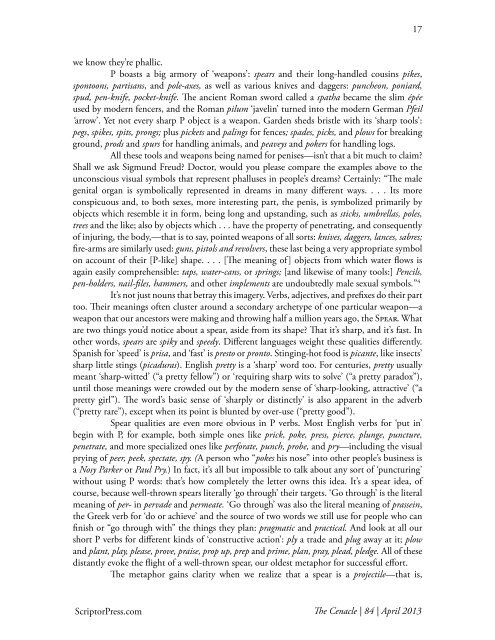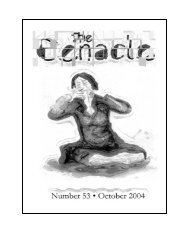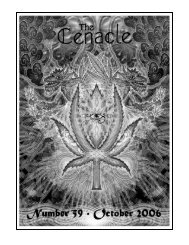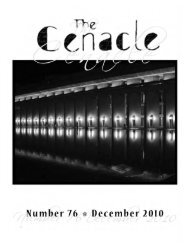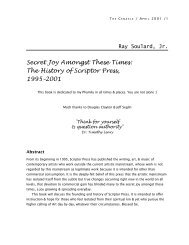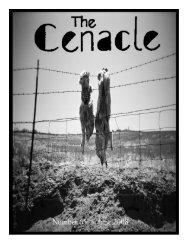Joe Ciccone - The ElectroLounge
Joe Ciccone - The ElectroLounge
Joe Ciccone - The ElectroLounge
You also want an ePaper? Increase the reach of your titles
YUMPU automatically turns print PDFs into web optimized ePapers that Google loves.
17<br />
we know they’re phallic.<br />
P boasts a big armory of ‘weapons’: spears and their long-handled cousins pikes,<br />
spontoons, partisans, and pole-axes, as well as various knives and daggers: puncheon, poniard,<br />
spud, pen-knife, pocket-knife. <strong>The</strong> ancient Roman sword called a spatha became the slim épée<br />
used by modern fencers, and the Roman pilum ‘javelin’ turned into the modern German Pfeil<br />
‘arrow’. Yet not every sharp P object is a weapon. Garden sheds bristle with its ‘sharp tools’:<br />
pegs, spikes, spits, prongs; plus pickets and palings for fences; spades, picks, and plows for breaking<br />
ground, prods and spurs for handling animals, and peaveys and pokers for handling logs.<br />
All these tools and weapons being named for penises—isn’t that a bit much to claim<br />
Shall we ask Sigmund Freud Doctor, would you please compare the examples above to the<br />
unconscious visual symbols that represent phalluses in people’s dreams Certainly: “<strong>The</strong> male<br />
genital organ is symbolically represented in dreams in many different ways. . . . Its more<br />
conspicuous and, to both sexes, more interesting part, the penis, is symbolized primarily by<br />
objects which resemble it in form, being long and upstanding, such as sticks, umbrellas, poles,<br />
trees and the like; also by objects which . . . have the property of penetrating, and consequently<br />
of injuring, the body,—that is to say, pointed weapons of all sorts: knives, daggers, lances, sabres;<br />
fire-arms are similarly used: guns, pistols and revolvers, these last being a very appropriate symbol<br />
on account of their [P-like] shape. . . . [<strong>The</strong> meaning of] objects from which water flows is<br />
again easily comprehensible: taps, water-cans, or springs; [and likewise of many tools:] Pencils,<br />
pen-holders, nail-files, hammers, and other implements are undoubtedly male sexual symbols.” 4<br />
It’s not just nouns that betray this imagery. Verbs, adjectives, and prefixes do their part<br />
too. <strong>The</strong>ir meanings often cluster around a secondary archetype of one particular weapon—a<br />
weapon that our ancestors were making and throwing half a million years ago, the Spear. What<br />
are two things you’d notice about a spear, aside from its shape That it’s sharp, and it’s fast. In<br />
other words, spears are spiky and speedy. Different languages weight these qualities differently.<br />
Spanish for ‘speed’ is prisa, and ‘fast’ is presto or pronto. Stinging-hot food is picante, like insects’<br />
sharp little stings (picaduras). English pretty is a ‘sharp’ word too. For centuries, pretty usually<br />
meant ‘sharp-witted’ (“a pretty fellow”) or ‘requiring sharp wits to solve’ (“a pretty paradox”),<br />
until those meanings were crowded out by the modern sense of ‘sharp-looking, attractive’ (“a<br />
pretty girl”). <strong>The</strong> word’s basic sense of ‘sharply or distinctly’ is also apparent in the adverb<br />
(“pretty rare”), except when its point is blunted by over-use (“pretty good”).<br />
Spear qualities are even more obvious in P verbs. Most English verbs for ‘put in’<br />
begin with P, for example, both simple ones like prick, poke, press, pierce, plunge, puncture,<br />
penetrate, and more specialized ones like perforate, punch, probe, and pry—including the visual<br />
prying of peer, peek, spectate, spy. (A person who “pokes his nose” into other people’s business is<br />
a Nosy Parker or Paul Pry.) In fact, it’s all but impossible to talk about any sort of ‘puncturing’<br />
without using P words: that’s how completely the letter owns this idea. It’s a spear idea, of<br />
course, because well-thrown spears literally ‘go through’ their targets. ‘Go through’ is the literal<br />
meaning of per- in pervade and permeate. ‘Go through’ was also the literal meaning of prassein,<br />
the Greek verb for ‘do or achieve’ and the source of two words we still use for people who can<br />
finish or “go through with” the things they plan: pragmatic and practical. And look at all our<br />
short P verbs for different kinds of ‘constructive action’: ply a trade and plug away at it; plow<br />
and plant, play, please, prove, praise, prop up, prep and prime, plan, pray, plead, pledge. All of these<br />
distantly evoke the flight of a well-thrown spear, our oldest metaphor for successful effort.<br />
<strong>The</strong> metaphor gains clarity when we realize that a spear is a projectile—that is,<br />
ScriptorPress.com<br />
<strong>The</strong> Cenacle | 84 | April 2013


